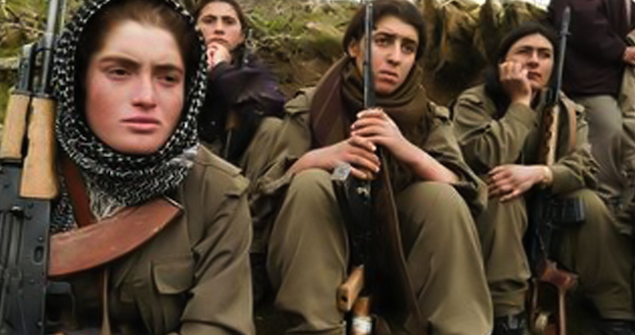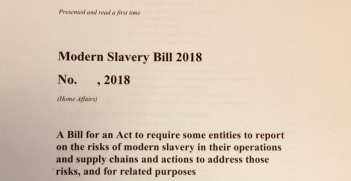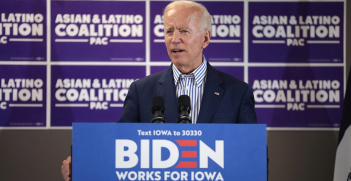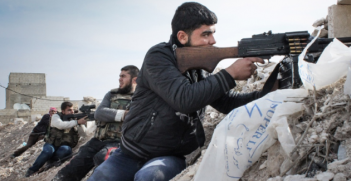The Kurds – Not Iraq’s Saviours

Aspirations for Kurdish independence face many regional challenges.
The world looked on in horror in August 2014, when small numbers of Islamic State fighters drove vastly superior Iraqi army units from Mosul, the country’s second city. The Iraqi army’s failure was regarded as a fiasco but it was widely assumed that the Kurdish militia (Peshmerga – ‘one who confronts death’) would be more than a match for the Islamic State forces in subsequent confrontations and would restore order across the region.
The Peshmerga are the modern reflection of a Kurdish warrior tradition that goes back thousands of years. They are integral to the development of the Kurdish autonomous region and to Kurds’ aspirations to statehood. Over the 20th century, Kurdish fighters have challenged the British, Turkish and Iraqi armies and, through the 1980s and 1990s, put up creditable resistance to Saddam Hussein’s attempts to bring the Kurdish region back under the rule of Baghdad.
So it was something of a shock when Peshmerga units crumbled before the Islamic State on the road to the Kurdish capital, Irbil (Howler in Kurdish). Earlier, the Peshmerga had seized full control of Kirkuk, a centre of Iraqi oil production but also a city on the border of Arab and Kurdish Iraq and, as such, a symbol of the divisions that are plaguing the country. However, when the Islamic State turned its full attention to the Kurdish capital, Irbil’s defenders were found to be disunited, inadequately armed and poorly led. They had to be rescued by US airpower.
The lessons of the months before Howler was secured are central to the future status of Kurdistan. The first is that it had been almost 20 years since the Peshmerga had seen serious conflict with Iraqi forces and the Peshmerga units were not battle-hardened. The Peshmerga had performed best when they were operating in the mountainous areas of the east of the region and along the Turkish border. The regional capital, however, is on a flat, featureless and almost indefensible plain and their traditional guerrilla tactics were no match for the fast-moving and flexible Islamic State fighters.
A more important lesson to be learned, however, concerns the geo-political limits to Kurdish capacity. The borders between the Kurdistan region and the Arab parts of Iraq have long been contested, with the two major cities of the area, Mosul and Kirkuk, serving as conductors of the tensions between Arabs, Kurds, Turkomen and other minorities who lay claim to the area.
Kirkuk has been largely under Kurdish control since Saddam’s removal but the city is permanently tense and volatile. The Peshmerga hold the city with difficulty and in January Islamic State fighters infiltrated the city’s defences and occupied several districts before being driven out.
Mosul is an even greater challenge to Kurdish aspirations because of the deep Arab attachment to the city and because the city is further from the Kurdish heartland. For the Peshmerga to seize and hold Mosul would be a major military and political challenge.
In the past few months, with some rearmament and training, the Peshmerga have regrouped and are now playing an important role in the fight against Islamic State. They have begun to make inroads into Islamic State territory along their border and contributed to the successful defence of the Syrian border town of Kobane.
However, the limits to the Kurds’ capacity must be acknowledged. They cannot be a substitute for the incompetent Iraqi army and must not be too closely associated with the vicious Shi`a militia that are wreaking vengeance on Sunni communities that are liberated from Islamic State rule.
The further the Kurdish forces go into mixed and Arab majority areas the more difficult their task will become. Arabs of the region would regard Kurdish control of their territories much as they regard the presence of the Shi`a dominated Iraqi army – as foreign occupation.
It is to be hoped that the Kurds have learnt from their experiences at the hands of Islamic State. Initially, as the Iraqi state began to disintegrate, there was much talk of secession. The regional President, Barzani, suggested a plebiscite over whether Kirkuk would become part of Kurdistan. The Turks’ permissive attitude to Kurdish oil sales through Turkey may also have encouraged dreams of independence. The set-backs before Irbil and in the drawn-out battle for Mount Sinjar, however, seem to have given the Kurdish leadership pause for thought. While there would seem to be no question that ordinary Kurds long for a state of their own, the past six months have led many to conclude that the time for independence has not arrived.
The problem for the Kurds is twofold. While the United States and the government in Baghdad would like to use the Peshmerga as ground troops to support the air war against the Islamic State, neither has any interest in allowing the Kurds to become too strong militarily. Washington has made clear on a number of occasions its strong preference for Kurdistan to remain part of Iraq – albeit with considerable autonomy. The Iraqi government would have great difficulty coming to terms with formal Kurdish independence.
The related aspect of this problem is that the Kurds’ neighbours are unlikely to look favourably on Kurdish independence. All have significant Kurdish minorities who have been exploited in regional rivalries. All these countries, however, would strongly resist the prospect of independence for Iraq’s Kurds for fear that their own Kurdish populations might be inspired to seek similar status for themselves. Turkey, with the largest population of Kurds, has collaborated with the Iraqi Kurds’ efforts to export oil through Turkish ports. It is most unlikely, however, if the Turks would be so relaxed if there was a serious prospect of Kurdish independence.
Eventually a new order will emerge in Iraq from the bedlam of the last decade and the Kurds will have to live with this new order and with their neighbours. Better they look to their own borders than become deeply embroiled in an inter-Arab conflict.
Dr Anthony Billingsley is a Senior Lecturer of International Relations at the School of Social Sciences, Faculty of Arts and Social Sciences, UNSW. His main research focus is the Middle East and international law. This article can be republished with attribution under a Creative Commons Licence.





